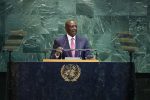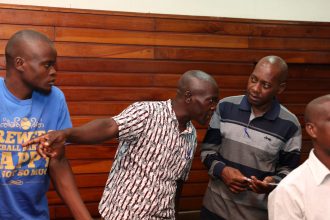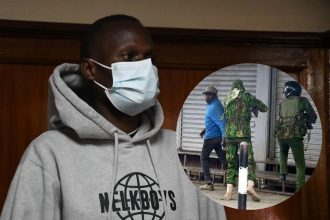The harrowing case of Paul Nthenge Mackenzie, the self-proclaimed pastor and alleged mastermind behind the Shakahola massacre, resumed on Tuesday at the Tononoka Children’s Court in Mombasa.
Mackenzie, alongside 38 co-accused, face charges of torture and cruelty to children linked to his Good News International Church (GNI), as the court heard chilling testimonies of abuse, starvation, and neglect that contributed to one of Kenya’s deadliest cult tragedies.
The hearing, presided over by Principal Magistrate Nelly Chepchirchir, saw five witnesses deliver emotional accounts of the suffering endured by children under the influence of Mackenzie’s apocalyptic Christian group.
The Shakahola massacre, which came to light in 2023, resulted in the exhumation of 429 bodies from the Shakahola Forest, with many deaths attributed to starvation, asphyxia, and other abuses.
Authorities believe the true death toll may never be known, as some bodies were reportedly disposed of in deep pit latrines scattered across the expansive Chakama ranch where the cult operated.
Children Deprived of Basic Rights
Helen Mwikali Kimwele, manager of the Mayungu Children’s Centre in Malindi, testified that in 2017, 43 children aged between 4 and 13 were rescued from GNI followers and placed under her care by court order.
Presenting an admission register, Kimwele detailed how these children had been denied education and medical care by their parents, who were devoted followers of Mackenzie.
“The children were in a dire state,” she told the court, noting that their parents later entered plea agreements in a Malindi court, promising to re-enroll them in school and provide medical treatment.
Tragically, most of these children later went missing and are now presumed to have perished in the Shakahola massacre that unfolded five years later in 2022.
The court heard that the cult’s practices, which included extreme fasting to “meet Jesus,” led to the deaths of hundreds, with children among the most vulnerable victims.
The first bodies recovered from shallow graves in the 800-acre Shakahola Forest were predominantly those of children, some buried alongside their parents.
A Survivor’s Escape and a Brother’s Death
In a dramatic testimony, a social worker from a children’s home, appearing as the 24th prosecution witness, recounted the story of a 13-year-old boy who escaped the horrors of Shakahola.
The boy’s father, Gilbert Khea—one of the accused—had retrieved him from the rescue center on May 21, 2019, using a court order and a lawyer’s letter.
Khea signed exit forms, promising to update the center on the child’s progress, but soon became unreachable after his phone was disconnected.
On March 25, 2023, the boy returned to the rescue center in a severely weakened state after cycling through the night to escape the forest.
“A colleague called to say the boy had returned,” the social worker testified. “We immediately contacted the children’s officers, re-admitted him, and began counseling and school reintegration.”
The boy revealed the horrific conditions in Shakahola, including widespread starvation and the death of his younger brother, who succumbed to hunger.
He pleaded for the rescue of other children still trapped in the forest, a plea that underscored the scale of the tragedy.
Systemic Failures and Missing Children
Another witness, a private school principal, described how a GNI member withdrew his two sons from school to join Mackenzie in Shakahola.
The children have not been seen since, adding to the growing list of missing victims.
The court heard that Mackenzie encouraged his followers to gather at his farm for fasting, a practice that authorities believe led to the deaths of 214 people from starvation, 39 from asphyxia, and 14 from head injuries, with many causes of death still unascertained.
Mackenzie, who was arrested in April 2023, has already spent over a year in custody, alongside his associates.
He faces multiple charges across four courts in the coastal region—including Malindi, Mombasa, Shanzu, and Tononoka—ranging from murder and manslaughter to terrorism and child cruelty.
In January 2024, Mackenzie and 94 co-defendants pleaded not guilty to terrorism charges in a separate hearing. Mombasa Chief Magistrate Alex Ithuku previously denied bail to the accused, citing their lack of a permanent residence.
As the trial continues, more witnesses are expected to testify in the coming days, shedding further light on the atrocities committed by Mackenzie and his followers.
For survivors and the families of the victims, the court proceedings offer a glimmer of hope for accountability in the face of unimaginable loss.












